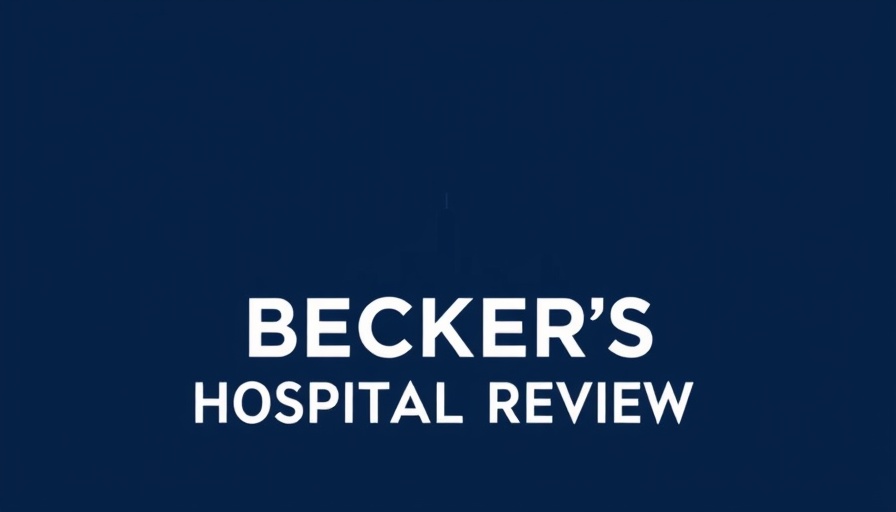
Urgent Recall: Smiths Medical's Infusion Pumps Raise Alarm
In a significant move that has caught the attention of the healthcare community, Smiths Medical has announced a Class I recall for specific models of its CADD-Solis and CADD-Solis VIP ambulatory infusion pumps. Classified as the most serious recall type by the FDA, these devices pose a health risk that has the potential to interrupt or delay critical medication delivery. As independent healthcare providers, understanding the implications of this recall can prepare you to optimize patient care effectively.
Understanding the Risks Involved
The FDA's findings reveal various concerns regarding these infusion pumps. Primarily, the manufacturer identified three issues that need urgent attention:
- False Occlusion Alarms: Under certain conditions, the infusion pumps may inaccurately signal an "upstream occlusion" alarm. This can stop therapy if the priming or infusion steps take longer than one hour. Given that timely medication administration is crucial, these alarms could unintentionally compromise patient safety.
- Thermal Damage Risk: Internal damage to the battery may lead to overheating, creating a burn risk for healthcare staff. Standard alarms might not alert users to this growing issue, which is particularly concerning in busy clinical environments.
- Wireless Connectivity Issues: Changes in networks can interfere with the pumps' wireless module. This disconnection could result in high-priority alarms and disruption of patient infusions, directly impacting care delivery.
Fortunately, no serious injuries or deaths related to these pumps have been reported to date. However, the potential for critical risks underscores the need for vigilance among healthcare providers.
Implications for Independent Providers
As independent physicians, nurse practitioners, and urgent care clinic directors, keeping abreast of device recalls is essential for ensuring patient safety and maintaining a reputation for excellence. With the increasing prevalence of technology in healthcare, being alert to the potential risks posed by certain devices enables better management of patient care. This recall highlights the importance of ensuring compliance with safety standards and provides an opportunity for practices to enhance their monitoring and management strategies.
Adaptive Strategies for Independent Practices
In light of this recall, independent practitioners can adopt several strategies to safeguard patient care:
- **Educate Staff:** Ensure all medical personnel are aware of the recall details and trained in what to look for regarding alarm systems and device functionalities.
- **Patient Communication:** Inform patients who may be using these devices about the recall and discuss any potential risks related to their ongoing treatment plans.
- **Invest in Technology:** Consider incorporating patient engagement tools and practice automation strategies to minimize risks and streamline workflows. Tools such as medical billing recovery and billing compliance services can help mitigate financial impacts.
Future-Proofing Independent Practices
As healthcare continues to evolve with new technologies, independent practices must be adept at integrating innovative solutions that ensure not only compliance but also enhance overall practice efficiency. With trending topics such as remote therapeutic monitoring and Medicare reimbursement emerging, practitioners should explore new avenues to enhance service delivery and patient satisfaction.
Integrating practice efficiencies does not just include advanced technology; it also involves adopting comprehensive healthcare automation that helps with everything from HR strategies to telehealth revenue maximization. Embracing these changes can benefit not only patient outcomes but also improve your bottom line.
Conclusion: Proactive Engagement for Better Healthcare
With Smiths Medical's recent recall, it is crucial for independent healthcare providers to stay informed about the devices they utilize daily. By understanding the implications of such recalls and integrating proactive measures, practitioners can ensure the continued safety and satisfaction of their patients. Lead your practice towards a more resilient future by adopting new technologies and strategies that help you navigate challenges like these successfully. We encourage all healthcare providers to review their equipment and stay updated on safety notifications to foster trust and reliability.
Take Action Today: Equip your practice with the latest knowledge and employ patient engagement tools that can optimize both care and practice efficiency. Start making proactive changes today to ensure your practice is prepared for any challenges ahead!
 Add Row
Add Row  Add
Add 




Write A Comment